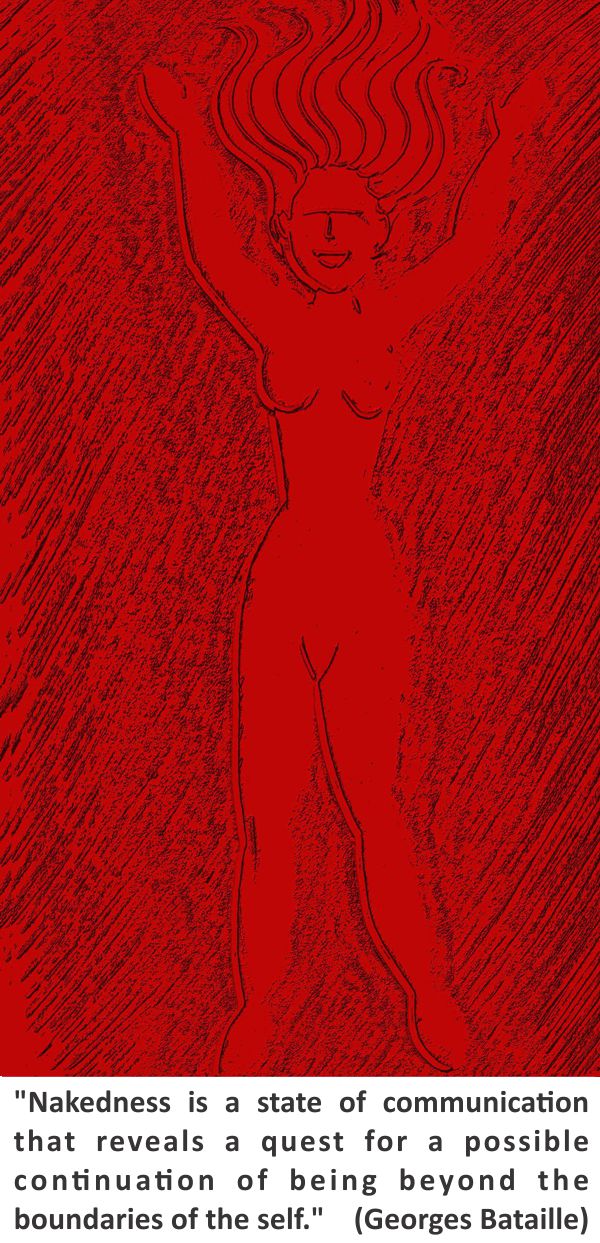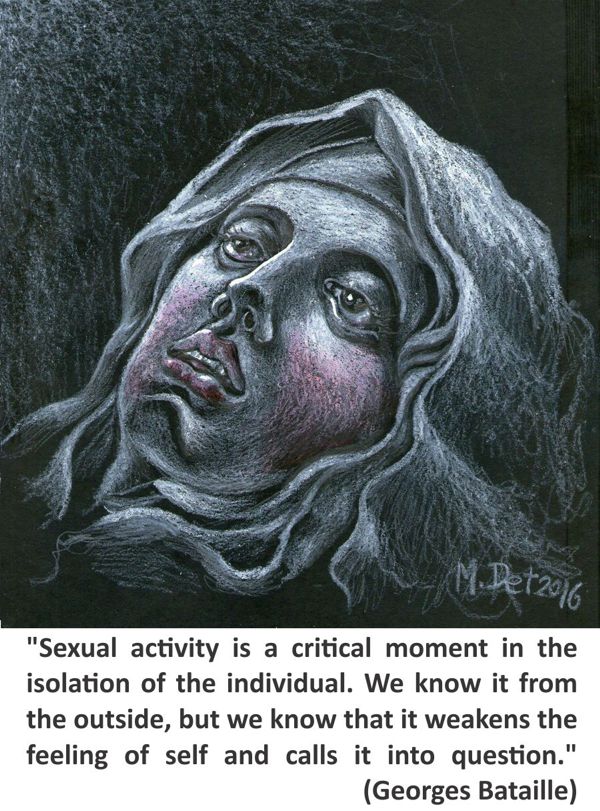>GEORGES BATAILLE
Sexuality as death
 Georges Bataille (1897-1962) was a French intellectual who wrote many essays in philosophy and other fields. He studied at École Nationale des Chartes in Paris, and then worked occasionally as a librarian. He published extensively, founded several journals and literary groups, and at different stages was interested in different approaches to philosophy and art. He often wrote essays, novels, and poems on socially “inappropriate” topics such as torture, pornography, and bodily fluids. He died at the age of 64 from malfunction of blood-arteries in the brain. After his death his writings had a considerable influence on important thinkers.
Georges Bataille (1897-1962) was a French intellectual who wrote many essays in philosophy and other fields. He studied at École Nationale des Chartes in Paris, and then worked occasionally as a librarian. He published extensively, founded several journals and literary groups, and at different stages was interested in different approaches to philosophy and art. He often wrote essays, novels, and poems on socially “inappropriate” topics such as torture, pornography, and bodily fluids. He died at the age of 64 from malfunction of blood-arteries in the brain. After his death his writings had a considerable influence on important thinkers.
The following text is adapted (and slightly simplified) from Bataille’s book Eroticism, Death, and Sensuality (originally published under the title L’Erotisme in 1957). Here Bataille develops the idea that sexuality is intimately related to death. (Likewise, taboo, violence, and transgression are related to death). Normally we are “discontinuous” – in other words, there is a separation between you and me and him and her. When we die, we become “continuous” with the rest of the world, since we return to the elements and no longer have a separate identity. In sexual activity we seek to merge with the other, and in the ecstasy and climax we lose our separate identity. In this sense, sexuality is a disintegration of our “discontinuity,” and it is therefore a movement towards death. This is why Bataille suggests that the sexual act involves a “crisis” – the experience of death-like sexual ecstasy.
From the Introduction
We are discontinuous beings, individuals who perish in isolation in the middle of an incomprehensible adventure, but we yearn for our lost continuity. We find the situation of our random and brief individuality hard to bear. Side by side with our tormenting desire that this temporary life would last, we are also obsessed with a primordial continuity that would link us with everything that exists.
 […]
[…]
The whole business of eroticism is to destroy the self-contained character of the lovers as they are in their normal lives. Stripping naked is the decisive action. Nakedness contrasts with self-possession, in other words with discontinuous existence. It is a state of communication that reveals a quest for a possible continuation of being beyond the boundaries of the self. Bodies open out to a state of continuity through secret channels that give us a feeling of obscenity. Obscenity is our name for the uneasiness which upsets the physical state associated with self-possession, with the possession of a recognized and stable individuality.
From Chapter 9: Sexual Plethora and Death
Sexual activity is a critical moment in the isolation of the individual. We know it from the outside, but we know that it weakens the feeling of self and calls it into question. I am using the word “crisis” – the inner effect of an event that is known objectively. As an objective fact of knowledge, the crisis is nevertheless responsible for a basic inner phenomenon.
[…]
For the animal, the only possible modification of individual discontinuity is death. Either the animal dies or else when the tumult has died down, its discontinuity remains intact. In human life, on the other hand, sexual violence causes a wound that rarely heals by itself. It has to be closed, and it will not remain closed without constant attention based on anguish. Primary anguish when linked with sexual disturbance signifies death. The violence of this disturbance re-opens in the mind of the person experiencing it (who also knows what death is) the abyss that death once revealed. The violence of death and sexual violence, when they are linked together, have this dual significance. On the one hand, the convulsions of the body are more acute when they are near to a black-out, and on the other hand a black-out, as long as there is enough time, makes physical pleasure more exquisite. Mortal anguish does not necessarily lead to sensual pleasure, but that pleasure is more deeply felt during mortal anguish.
 Erotic activity is not always as openly sinister as this, it is not always a crack in the system. But secretly, and at the deepest level, the crack belongs intimately to human sensuality and is the driving force of pleasure. Fear of dying makes us catch our breath, and in the same way we suffocate at the moment of crisis. In principle, eroticism seems at first sight the very opposite of this horrifying paradox. It is a plethora of the genital organs. An animal impulse in us is the cause of the crisis. But the organs do not freely enter this state of chance. It cannot take place without the consent of our will. It upsets an ordered system on which our efficiency and reputation depend. In fact, the individual splits up and his unity is shattered from the first instant of the sexual crisis. Just then the plethoric life of the body comes up against the mind's resistance. Even an apparent harmony is not enough; beyond consent, the convulsions of the body demand silence and the spirit's absence. The physical urge is curiously foreign to human life, loosed without reference to it so long as it remains silent and keeps away.
Erotic activity is not always as openly sinister as this, it is not always a crack in the system. But secretly, and at the deepest level, the crack belongs intimately to human sensuality and is the driving force of pleasure. Fear of dying makes us catch our breath, and in the same way we suffocate at the moment of crisis. In principle, eroticism seems at first sight the very opposite of this horrifying paradox. It is a plethora of the genital organs. An animal impulse in us is the cause of the crisis. But the organs do not freely enter this state of chance. It cannot take place without the consent of our will. It upsets an ordered system on which our efficiency and reputation depend. In fact, the individual splits up and his unity is shattered from the first instant of the sexual crisis. Just then the plethoric life of the body comes up against the mind's resistance. Even an apparent harmony is not enough; beyond consent, the convulsions of the body demand silence and the spirit's absence. The physical urge is curiously foreign to human life, loosed without reference to it so long as it remains silent and keeps away.
When you subscribe to the blog, we will send you an e-mail when there are new updates on the site so you wouldn't miss them.
